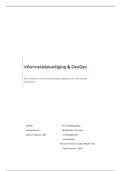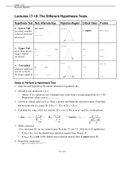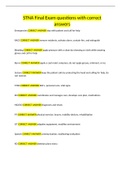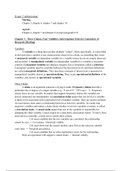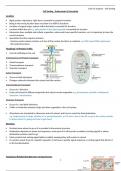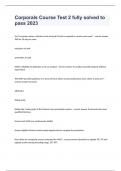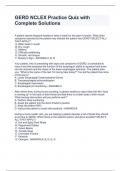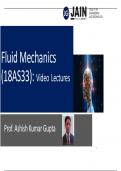Act 1, Scene 1 (Lear’s Palace):
“It appears not which of the dukes he values most” (Gloucester) - From the start,
Lear is portrayed as indecisive.
Sennet - Exposes Lear’s initial authority.
“Attend the lords of France and Burgundy, Gloucester” (Lear) “I shall, my liege” -
Obeyed instantly by Gloucester.
Lear then explains his “darker purpose” - To divide the kingdom based on his
daughter’s love.
“Unburthen’d crawl towards death” - Infantile image.
“Which one of you shall we say doth love us most?” - Love is an abstract noun and
therefore immeasurable - Lear constantly attempts to measure the immeasurable
throughout the play.
Goneril then professes her love, exaggerating - Using words that connote the theme
of measure - “More” “Dearer” “Beyond” “No less” and “As much”.
“[Aside] What shall Cordelia speak? Love, and be silent.” - Cordelia is honest - Creates
a juxtaposition between private and public - Lear does everything in public, a matter
as significant as this should be done privately.
Regan follows Goneril - Again exaggerating her love for her father.
“Speak” - It is now Cordelia’s turn - Lear’s use of imperatives highlights his authority.
“Nothing, my lord” - Cordelia refuses.
“Nothing?”
“Nothing.” - Cordelia refuses to play his game.
“Nothing will come of nothing: speak again” - Stichomythia between Lear and
Cordelia is used by Shakespeare to create tension.
Cordelia explains that she loves him “no more nor less” than one should love their
father - Tying into the repeated image of measure.
“Why have my sisters husbands, if they say they love you all” - Cordelia attempted to
expose the mindlessness of the situation - Lear is blind to it.
“For, by the sacred radiance of the sun, the mysteries of Hecate and the night, by all
the operation of the orbs from whom we do exist and cease to be, here I disclaim all
my paternal care… The barbarous Scythian” - Lear’s hamartia of uncontrollable anger
is exposed - King Lear is set in a Pagan setting, pre-Christian - Use of the personal
pronoun highlights his rage - Internal conflict.
Kent attempts to calm Lear down.
Lear replies: “Come not between a dragon and his wrath. I loved her most and
thought to set my rest on her kind nursery” - Lear compares himself to a dragon -
Foolish as in reality he is a weak, old man - The word “nursery” implies childishness -
Lear is immature.
“Call France. Who stirs?” (Lear) - Conflict between authority and his identity.
“Thy youngest daughter does not love you least” - Kent tries to inform Lear of the
truth - Lear refuses to understand - Hubris.
Lear banishes Kent.
Offers Cordelia to Burgundy but with no dowry.
, “Now her price has fallen” (Lear) - Theme of measure - A paradox is created between
love and material wealth - Sees her in terms of wealth.
France exposes the irony of the situation - She was Lear’s “best object” - How did she
go so quickly from most loved to most hated?
“I am richer” - Cordelia is richer for not giving Lear what he wanted.
“I am glad I am not (like her sisters)” - Very defiant.
“I have sworn; I am firm” - Lear’s stubbornness - One of his flaws - Childish.
“I shall not be his wife” - Cordelia’s assertiveness - Defies her role as a woman.
“The jewels of our father, with wash’d eyes” (Cordelia) - Metaphor.
“Prescribe not us our duty.” - Regan uses the royal pronoun - Power hungry nature.
“Let your study be content your lord, who hath receiv’d you” Regan and Goneril’s
speech makes up one line of iambic pentameter.
They speak in blank verse which makes them sound cold and honest - In contrast to
how they were before.
Act 1, Scene 2 (Gloucester’s Palace):
Starts with Edmund’s soliloquy - He questions society with plosives “With base? With
baseness? Barstardy? Base, base?” - Referring to society branding him based on his
legitimateness. His jealousy of Edgar is exposed “Legitimate Edgar, I must have your
land”.
The Law of Primogeniture - A system of inheritance in which a person's property
passes to their firstborn legitimate child upon their death - He wishes to have his
brother’s privilege.
Edmund is a product of adultery - He is a product of sexual desire.
Edmund manipulates Gloucester with the letter supposedly from Edgar - The letter
reflects the story of Lear “If our father would sleep till I wak’d him, you should enjoy
half his revenue forever”.
Gloucester mirrors Lear by allowing himself to be so easily manipulated by his son.
Gloucester is very superstitious - “These late eclipses in the sun and moon portend
no good to us… Love cools, friendship falls off, brothers divide” - Predicts the end of
social order - Predetermined fate.
Edmund calls his father foolish “foppery” after he exits.
Edgar enters - Edmund manipulates him - Dramatic irony.
“I promise you, the effects he writes of succeed unhappily; as of unnaturalness
between the child and the parent; death, dearth, dissolutions of ancient amities;
divisions in state; menaces and maledictions against king and nobles; needless
diffidences, banishment of friends, dissipation of cohorts, nuptial breaches, and I
know what” - An astronomer predicted bad things - From “as” is removed in the Folio
version, perhaps to avoid political censorship.
Act 1, Scene 3 (Duke of Albany’s Palace):



